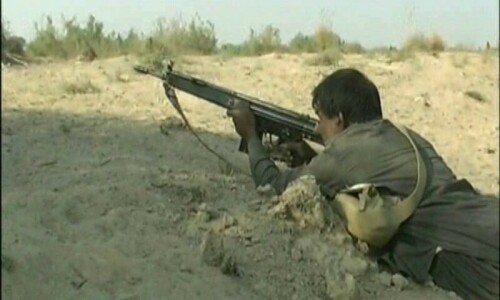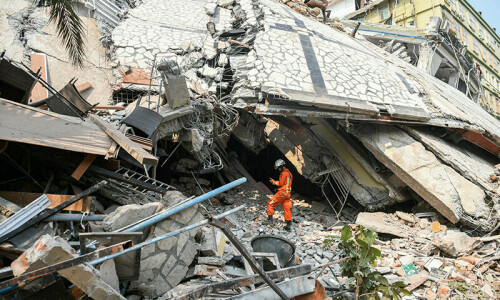LAHORE: All those states, which won war against domestic insurgencies, have done so by winning the war of narrative bringing population behind them, breaking the back of insurgents through military and social means and finally winning peace through implementing criminal justice system through civil institutions, says Moeed Yusuf, South Asia Programmes at the United States Institute for Peace director.
Speaking at a dialogue – Meeting the Challenge of Terrorism: Counter Terrorism Lessons from South Asia – arranged by Institute for Policy Reforms, Mr Yusuf said that Pakistan was not an exception; if it has to win war against terrorism, it has win war of narrative, and it should come mainly from the right wing forces because left has lost persuasive influence on those waging the war.
He said the right-wingers need to clear the popular and leadership confusion about the need and aims of operation against the extremists. In Pakistan, extremist forces have successfully conflated three opposing strands in their narrative – the use of political Islam, anti-Americanism and state failure at the political and social level.
All of them have different connotations, but they are integrated by extreme forces and created confusion among people. This confusion is also reflected in the mind of political leaders. That is why response to terrorism fluctuates between two extremes; crushing the terrorists and then accommodating them through talks.
In the absence of any long-term policy, the temporary response varies on the amount of violence created by terrorists at a particular point of time. The Indian cleared confusion and came out with clear policy counter-terrorism within six to seven years of suffering violence.
The Sri Lankan did the same in 15 year. Even Nepalese finalised the contours of their anti-terrorism policy in seven years. Pakistan has been unable, or un-willing, to do so because of bottom up (popular) pressure generated by the state failure and top-down pressure created by inability of the political leadership to find right balance between use of force and talking to extremists.
All states have used force and talks (persuaded terrorists back to political mainstreaming without abandoning their ideology) simultaneously. Pakistan has neither been able to crush extremists nor politically main stream them.
It also suffered at policy formulation because it has also not been able to create balance between its domestic policy of dealing with extremists and strategic goals in the region.
This confusion all around has resulted in policy inertia, which is taking toll on people of Pakistan. Though they have nerves to withstand psychological impact of the trauma, but for how long they can suffer remains to be seen.
Pakistan needs policy; who it is fighting, what it is fighting for and for how long it plans to fight. But it must keep in mind that military can win a war but would not be able to win peace if civilian institutions (police and criminal justice system) are not able to take over, he said.
Earlier, Humayun Akhtar Khan, former federal minister and chairman of the institution, clarified the context of the problem,; magnitude of the problem, policy failures, repeatedly aborted operations and possible blowback of the current operation.
Published in Dawn, June 19th, 2014















































